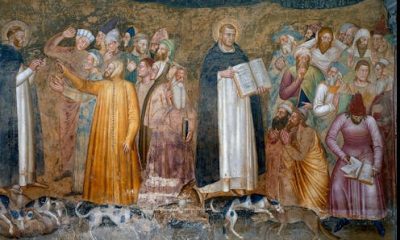“Fear stalks the land, including the Upper West Side,” I wrote to a friend the other day. A week before the election, everyone seems to be afraid.
Not that we’re afraid of the same things. Newspaper owners and corporate leaders fear Donald Trump’s retribution if they endorse Kamala Harris. Election workers fear the mob. Democrats fear losing votes because of the carnage in the Gaza Strip. Trump’s followers fear immigrants.
Walled up in our silos, we fear what the people in the other silo might inflict on us. The frightening visions have different names and faces, but everyone seems to fear the future.
Halloween’s ghoulish displays seem to have generated more sales than ever this year, inflation be damned. What with school shootings, random violence and a general atmosphere of threats, one would think we didn’t need to scare ourselves more.
But as psychologist Sarah Kollat has recently written, Halloween thrills and chills can feel warming and reassuring. People who have survived a frightening shared ordeal, be it a hurricane or flood or fire or war or even, apparently, a haunted house, feel significantly connected to those who have experienced the same fearful event alongside them.
Our fear can bring us together. It can also tear us apart.
Halloween provides the language to talk about threats, real or imagined. “The zombies have arrived, and we have to figure out how to navigate around them,” a citizen of a Vermont town was recently quoted as saying. She was talking about homeless people.
‘Treachery, Rage and black Fear’
It’s both easy and helpful to personify fear as something outside of us – to give it, in Shakespeare’s phrase, “a local habitation and a name.”
Fear looms and fades; visits at night; thrives in certain conditions. In his epic “The Aeneid,” the Roman poet Virgil describes the war god, Mars, as accompanied by his posse: “the god’s retainers – Treachery, Rage, and black Fear – pound beside him.”
This nightmare troika has a contemporary ring. If by treachery we understand traps, tricks, ambushes, we can plug in political debate, rife with accusations of mendacity; tricks and rage also characterize a good deal of public discourse. And isn’t anger the opposite side of the coin of fear?
Virgil, a great psychologist of many kinds of unease, also depicts a less aggressive manifestation of fear: “Up on the wall stood frightened mothers, gazing/After the dust cloud and the bronze-bright squadrons.” Uneasy spectators, helpless to protect their loved ones, they watch their sons marching to war. In a similar passage, “mothers, the unarmed commons,/And weak old men came pouring out to fill/Towers and roofs.”
Those of us not on a battlefield are in a position of tense watching and waiting.
We feel powerless to affect the outcome; the stakes are high; we fear the worst.
Love and heroism in short supply
Fear is linked to love. In Homer’s “Iliad,” Achilles is reluctant to fight for the Greek side not because he’s afraid of death, even though he knows his life may be short. Rather, he’s too angry to sacrifice his life for a cause and commanders he no longer believes in – until his beloved Patroklos is killed by Hector. Only then do Achilles’ mood and motivation change; he eagerly rejoins the fight.
Characters in Greek tragedies can make terrible decisions, be subject to madness, destroy themselves and others – but they are rarely afraid. The fear and pity Aristotle ascribes to tragedy are the emotions of the spectator.
In connection with fear, one of the only characters in Greek tragedy who readily comes to mind is Admetus, the husband of Alcestis in Euripides’ play of that name. Informed that he is fated to die, Admetus scrambles frantically for a substitute to die in his place. His own father huffily refuses, but his wife Alcestis volunteers.
When at the end of the play a veiled, silent figure we presume to be Alcestis reappears, there’s relief, as well as some nervous laughter. This play, with its – sort of – happy ending, turns out not to be a tragedy after all. It’s closer to dark comedy.
In our own time, rather than fear of death, fear of loss looms large – fear of isolation, humiliation, status; fear of poverty; fear of change. Elsewhere in “the Aeneid,” a character in the underworld makes a resonant remark about the afterlife: “Each bears his own ghosts.”
Maybe each of us has our own flavor of fear. There’s not much love or heroism in evidence these Halloween and preelection days. Anger and treachery, fear’s companions, are on daily display.
Rachel Hadas does not work for, consult, own shares in or receive funding from any company or organization that would benefit from this article, and has disclosed no relevant affiliations beyond their academic appointment.












